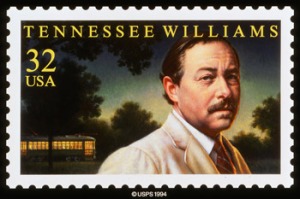 I have not yet read everything that Tennessee Williams ever wrote. Not yet. But as I enter the last week of the project, I have read every play in The Collected Plays of Tennessee Williams, Volumes I and II. So. I’m getting to know the playwright pretty intimately. And you know the old saying – familiarity breeds contempt.
I have not yet read everything that Tennessee Williams ever wrote. Not yet. But as I enter the last week of the project, I have read every play in The Collected Plays of Tennessee Williams, Volumes I and II. So. I’m getting to know the playwright pretty intimately. And you know the old saying – familiarity breeds contempt.
OK, not contempt. NOT contempt. But, just, I’ve read just, you know, a lot more BAD Tennessee Williams plays at this point than I ever expected. As I got into the extremes of his career – the very beginning, the very end (and the post-peak career stretched over a couple of decades) – I was reading at least one bad play for every good one, sometimes two bad plays for every good one. However – I must say this. Buried in there were some miracles, some wonderful things, and I never would have read them if I hadn’t dragged my way through the hot mess that surrounded them. So – here are four more reviews of Tennessee Williams plays, for worse and for better.
Let’s get this out of the way. Spring Storm is a disaster. This is evidenced by the fact that while it was written in 1937, it was not produced until 1995. Having said that, I’m not sure I’d want many plays I wrote in apprentice playwriting classes put on the stage today, and that’s where Tennessee Williams wrote it. The show focuses on main characters Heavenly and Dick; Heavenly seeks a permanent commitment from her stormy (ahem) lover, while Dick is restless for freedom from confinement. Meanwhile, Heavenly is courted by Arthur, a respectable alternative to the uncertain Dick – but though Heavenly’s prospects with Dick become more and more tenuous, she cannot give up her slim hope. (MILD SPOILERS BELOW)
It seems momentarily that Heavenly and Arthur will find consolation with one another – or perhaps that Arthur will find consolation elsewhere – but instead the play ends in a disaster disproportionate to the action; this, of course, feels contrived, and it is hard to mourn the multiple tragedies when they feel so mechanical. So that’s the big downside. On the other hand, Spring Storm pretty clearly serves as a kind of loose prequel for Sweet Bird of Youth – if Tennessee Williams has a miraculous strength as a playwright, it’s his ability to never give up on failed or partially successful material. A committed rewriter, he no doubt ruminated over this material for the 20 years between the two scripts, until something new and greatly improved emerged.
Not About Nightingales – ho-leeeeeeee crap. This is what I meant when I said you wade through the mess to find something amazing. This play was incredible, and astoundingly (I’m learning this stuff as I go along) ALSO was not produced until the ’90s, when Vanessa Redgrave unearthed the manuscript after working on a production of Orpheus Descending. She then brought it to Broadway, and it was nominated for 6 Tony Awards. In nineteen ninety freaking nine.
It. Is. Amazing. It is incredibly timely now. It is about the ills of the prison system (timely), abuse of power (timely), the corruption of law enforcement and corrections (TIMELY), and the justification of riot and counterviolence in situations of unbearable and persistent violence (TIMELY!!!!!). It should be in production right now. No other play I’ve read by Williams feels so contemporary and so prescient. Read it!
Okay – moving along – “I Rise in Flame, Cried the Phoenix” is about the last minutes in the life of D.H. Lawrence. It’s kind of philosophical, and I suspect I would have appreciated it more if I knew more about D.H. Lawrence. Like, a lot more. It was very, very short, and I found it interesting – but I don’t have a lot more to say about it than that.
The Milk Train Doesn’t Stop Here Anymore was another hidden gem, though much less so than Not About Nightingales. After I reached a certain mile marker in my march through Tennessee Williams, I started to say sarcastically to my husband at the start (or the fifth page, or the tenth page) of any given play, “Oh, a neurotic heiress/former debutante/wilting actress past her prime with an nervous complaint! How surprising!” These women show up over and over in Tennessee Williams, of course, because he was dealing with his own stuff – and Flora Goforth is that woman in this play. Chris, a young man who has been dubbed “The Angel of Death” because (purposely or by chance) he is often serves as companion to dying older women. His character is one part common gigolo, one part kind but disaffected boy, and one part abstraction – and it is that one part abstraction that gives the play its mystery and pleasure. Ms. Black, Flora’s longsuffering secretary, stands in for the audience to a certain degree, sympathizing with Chris and going around the imperious Flora when possible. In the end, the meanings and relationships are left a little uncertain, and that is delightful.
You might think this is it, but never fear! I’ve got lots more Williams still to review.